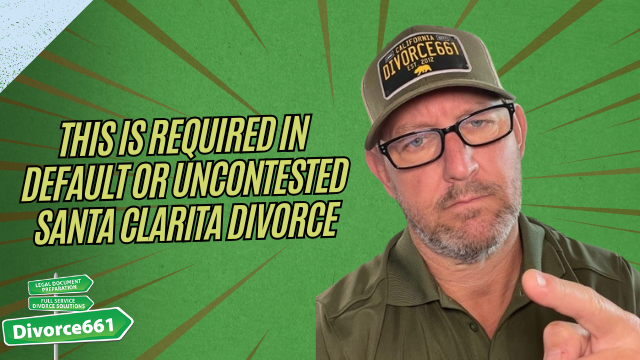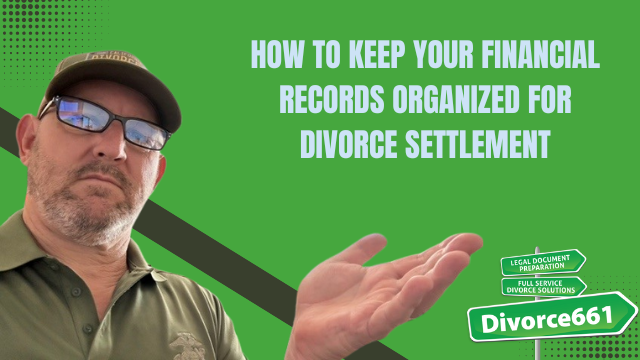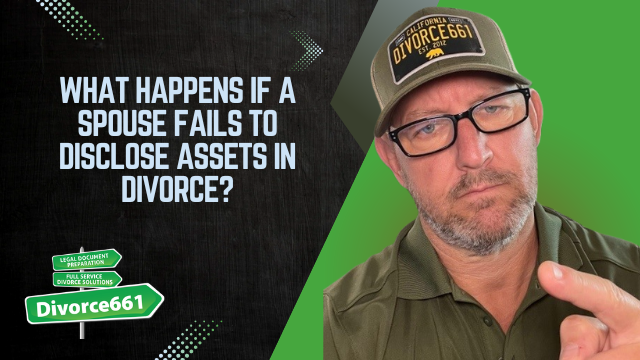THIS is REQUIRED IN DEFAULT or UNCONTESTED Santa Clarita Divorce
Whether you are moving forward with a default judgment because the other party did not respond, or you have an uncontested case where both sides agree on the terms, there is one document the respondent must still complete: the preliminary declaration of disclosure. This requirement is not optional. Failing to complete it can create problems later, from delays in finalizing the divorce to challenges enforcing the settlement.
What is the preliminary declaration of disclosure?
The preliminary declaration of disclosure is a formal set of financial statements and supporting documents that outline a party’s assets, debts, income and expenses. Its purpose is straightforward: to make sure both spouses have accurate information before any agreement is finalized or a default judgment is entered.
whether it’s a default with agreement or an uncontested divorce where a response was filed the respondent still needs to complete their preliminary Declaration of disclosure
Why it matters — even in default or uncontested cases
Some people assume that if the parties agree or if one side defaults, disclosure is unnecessary. That is not true. The court and both parties rely on full and honest financial disclosure to divide property, allocate debts and address support. Without it:
- Agreements can be opened or set aside if someone later shows they were unaware of assets or debts.
- Final judgments can be delayed while the missing information is supplied or disputes are resolved.
- Enforcement becomes harder when a party claims they did not have adequate information when they consented.
What to include
The exact forms and labels may vary by county or state, but the essential pieces are the same: a clear, documented picture of your finances. Prepare to include:
- List of assets and debts: bank accounts, real property, vehicles, retirement accounts, investments, mortgages, loans and credit card balances.
- Income information: recent pay stubs, information about business income if self-employed, and a history of income where relevant.
- Expense information: monthly living expenses for you and any dependents.
- Supporting documents: recent bank statements, tax returns, property deeds, loan statements and retirement account statements.
Practical steps to comply
- Gather documents right away. Waiting increases the chance of missing something important.
- Complete the required declaration and the accompanying schedules fully and accurately.
- Exchange the declaration with the other party as required by local rules. Keep proof of your exchange or service.
- If you are unsure which specific forms to use, contact the family court self-help center or consult a family law attorney to confirm local requirements.
Common questions
Does the respondent always have to disclose even if they never filed a response?
If a default is entered, the respondent may still be required to provide disclosures depending on the circumstances and local rules. It is safer to assume the disclosure requirement applies unless you are expressly told otherwise by the court or an attorney.
Can I wait until the final paperwork?
No. The purpose of the preliminary disclosure is to make sure full information is available during negotiation and before any final judgment or agreement. Delaying it can undermine the fairness and enforceability of any settlement.
Consequences of skipping disclosure
- Risk that a settlement will be challenged or set aside later.
- Possible sanctions from the court in some circumstances.
- Loss of leverage and trust during settlement discussions.
Checklist before filing or finalizing a default/uncontested divorce
- Complete the preliminary declaration of disclosure and accompanying schedules.
- Collect and attach supporting documents: paystubs, tax returns, bank and retirement statements.
- Serve or exchange the completed disclosure with the other party and retain proof.
- Confirm local court rules for timing and any required forms with the court or an attorney.
Final note
Disclosure is not paperwork for its own sake. It protects both sides and makes agreements durable and enforceable. Whether you are negotiating an uncontested settlement or moving forward after a default, completing the preliminary declaration of disclosure is a required and important step. If you have questions about which forms to use or how to serve disclosures in Santa Clarita, reach out to the court self-help center or a family law professional for guidance.










